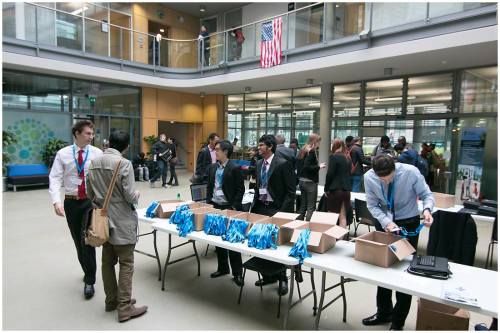Here are a few predictable, unpredictable, odd and interesting challenges you might bump into when running a conference – some slightly exaggerated for comic effect, some from my own experiences, some from other conferences – and all a little tongue-in-cheek.

What you might think: This should seem simple enough. To have a Model UN conference, you need committees – and for committees to run, they need rooms. Then you’ve got your Opening and Closing Ceremonies, your social events, and so on. What’s the problem, then – we just need one room per committee or event, right?
What about lunch – I’m sure food outlets are keen on a few hundred students’ worth of extra business over the weekend, right? They’ll put more people at the counter and keep the chefs around and everyone will be happy!
How wrong you’d be: Never underestimate a university. Rules for booking rooms will be made – only staff can book these rooms! Only the language department can book that one! Those rooms will cost you money after hours, but these won’t! Do you have students coming in from outside the university? Oh, that needs paying for too. Hang on, the Vice-Chancellor wants that building on a Saturday? You can’t have it, then!
The die is cast the day the semester starts. A couple hundred societies all scramble to tear rooms away from each other for the year, and the nice ones all get snapped up. Sometimes there’s no accounting for luck here. Sometimes nobody knows exactly how to book that one special room – and you get sent around in circles between staff members, the Students’ Union and the Help Centre.
Lunch is another tricky beast. Outlets don’t just want more business – they want guaranteed business. Oh wait, is the food court normally closed Sundays? You’ll have to pay to open the building before any of the outlets can open, then!
#2. Those pesky student realities get in the way
What you might think: Right, this is some legit adult responsibility here. We’ll meet every week, and have Skype meetings over the summer, and get all our conference venues, social events, study guides, handbooks and social media outreach plan done with before June is done with. That way, by the time term starts again, this’ll just cost me a few hours of work a week – I can still attend seminars and lectures and read everything I have to! And even if some work spills over, hey, it’s not like I can’t move a few classes around here and there – none of us do anything else anyway, we’ll manage!
How wrong you’d be: As grown-up as it feels to be organising an international gathering of young leaders to discuss global issues, sometimes reality comes back in to remind you that you’re still a mere student. That pre-summer drive evaporates when you hop on a plane or a train home and realise that half of your secretariat have full-time internships, summer school, vacations or journeys of self-discovery to get to over the long break. There go your Skype meetings.
Does it all work out once everyone’s back at university? Nope. Your Union finally opens for business again and that means paperwork. Event forms, speaker registration forms, contracts, risk assessments and a million other Soviet-era procedural contraptions threaten to jeopardise your daily re-revision time. You and your Secretariat members remember that your friends like spotting your face once in a while, y’know, just to know you’re alive. You remember that other societies and events exist too, dammit.
A friend once told me he literally had to rush to a tutorial right after registration and just before an Opening Ceremony, and avoid certain buildings so he wouldn’t run into another tutor for missing another class that same day. Because, y’know, strict tutors and university regulations.
#3. The Phantom Delegate(s)
What you might think: Woah, we’re getting loads of applications – we’re on track to overtake X conference and be the largest in the country! We’ve got people coming all the way from Ghana and Korea and Vanuatu – this is going to look great on the website. Hang on, though, that means some of our committees will be oversubscribed and we’ll have to turn away delegates or put them in other committees – bah, I’m sure we’ll think of something!
How wrong you’d be: You’ve heard of ballot stuffing and phantom voters. Well these exist in Model UN too, but unlike ballot stuffing, the people running the show really have no idea where these ghosts come from! They sign up, they (suspiciously) pay on time and they (suspiciously) submit position papers and individual information on time – and then come Registration Day, their name tags and lanyards lie sadly on the table, waiting patiently for their new owners.
Once in a while, there’s actually an explanation for this: visa application fraud. Your case for getting a travel visa looks a lot more legit when you’ve signed up and paid to an established international Model UN conference – a compliment to MUN, sure, but a headache for anyone running one.
And of course, while not technically phantom delegates, we have the pull-outs. Sponsorship deals fall through, trains get sidetracked by landslides… you get the idea. And suddenly you find that that ‘oversubscribed’ committee could actually do with a few more people and is missing a USA.
#4. Whatever can happen will happen
What you might think: I’ve got my tables, my spreadsheets and my charts – rooms are booked, guests have been invited, tickets have been sold – it’s all mapped out in my head, so nothing can go wrong this weekend! Or hey, at least, nothing will probably go wrong.
How wrong you’d be: Probabilities mean nothing in the face of Murphy’s Law. Planned a lovely evening reception in a nice, spacious atrium? There’ll be random tables laid out there for some event happening the next day – never mind that you’d already reserved the area. Hang on, the delegates want water in the committee? Damn, we’ll have to send someone off to the nearest Tesco and haul back a few boxes of bottles. Wait, what happened to the crisis room? Can’t use it? Now we’ll have to get another one and correct all the handbooks. What’s that about the club night? You mean it’s actually a free tonight? Now we’ve got to refund all the delegates, damn it!
#5. When technology fails you
What you might think: Technology’s made everything loads easier, we’ve just got to click this and that to get things done! Need to send delegates information – I’ll just email them and put it up on the website, that should do the trick!
How wrong you’d be: You don’t need to run a Model UN conference to know that emails are sent to spam and websites are ignored (“Websites? Bookmarks? I get my updates from Facebook!”). Expect people to ask you frequently about things on your FAQ page. Expect people to not know your foreign-language committee is run in a foreign language.
Hey, if it can happen to Steve Jobs, it can happen to anyone.
These are just a few interesting challenges you might come up against while putting a conference together, and while these are a little humorous in retrospect, they can be a nightmare when you’re actually living them! So as long as you go into your nine-month conference planning knowing that things will happen, you should be fine – and at least you won’t be taken be surprise.




